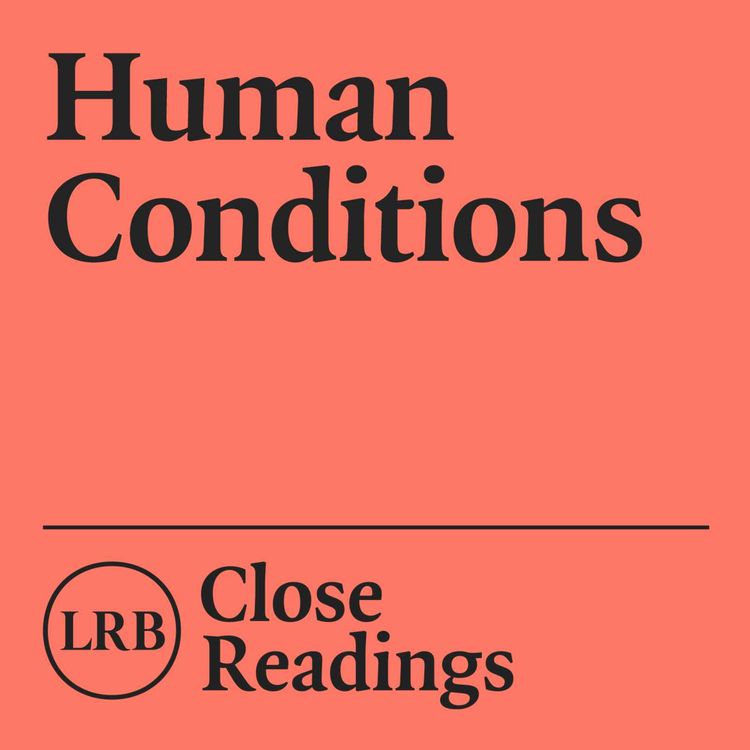Share

Human Conditions
‘The Souls of Black Folk’ by W.E.B. Du Bois
Brent Hayes Edwards and Adam discuss the ‘ur-text of Black political philosophy’, W.E.B. Du Bois’s The Souls of Black Folk. Spanning autobiography, history, biography, fiction, music criticism and political science, its fourteen essays set the tone for Black literature, political debate and scholarly production for the course of the 20th century. Souls was an immediate bestseller, the subject of furious debate and a foundational work in the new field of sociology.
Non-subscribers will only hear an extract from this episode. To listen to the full episode, and all our other Close Readings series, subscribe:
Subscribe to Close Readings:
Directly in Apple Podcasts: https://apple.co/3pJoFPq
In other podcast apps: lrb.me/closereadings
Further reading in the LRB:
Adam Lively: Fisticuffs
https://www.lrb.co.uk/the-paper/v16/n05/adam-lively/fisticuffs
Kevin Okoth: Resistance from Elsewhere
https://www.lrb.co.uk/the-paper/v44/n07/kevin-okoth/resistance-from-elsewhere
Lewis Nkosi: An UnAmerican in New York
https://www.lrb.co.uk/the-paper/v22/n16/lewis-nkosi/an-unamerican-in-new-york
Brent Hayes Edwards is a scholar of African American and Francophone literature and of jazz studies at Columbia University.
Get in touch: podcasts@lrb.co.uk
More episodes
View all episodes

13. ‘Sister Outsider’ by Audre Lorde
13:39||Ep. 13In the final episode of Human Conditions, Brent and Adam turn to Audre Lorde’s Sister Outsider, a collection of prose with exceptional relevance to contemporary grassroots politics. Like Du Bois, Césaire and Baraka, Lorde’s work defies genre: as she argues in this collection, ‘poetry is not a luxury’ but an essential tool for liberation. Throughout her work, Lorde sought to find and articulate new ways of living that encompassed her whole self – as a Black woman, poet, essayist, novelist, mother and lesbian. Brent and Adam discuss Lorde’s radical poetics and politics, and the case for poetry, anger, vulnerability, love and desire as the arsenal of revolution.This podcast was recorded on 21 August 2024.Non-subscribers will only hear an extract from this episode. To listen to the full episode, and all our other Close Readings series, subscribe:Directly in Apple Podcasts: https://apple.co/3pJoFPqIn other podcast apps: lrb.me/closereadingsBrent Hayes Edwards is a scholar of African American and Francophone literature and of jazz studies at Columbia University.Get in touch: podcasts@lrb.co.ukFurther reading and listening in the LRB:Reni Eddo-Lodge & Sarah Shin: On Audre Lordehttps://www.lrb.co.uk/podcasts-and-videos/podcasts/at-the-bookshop/reni-eddo-lodge-and-sarah-shin-on-audre-lorde-your-silence-will-not-protect-youJesse McCarthy & Adam Shatz: Blind Spotshttps://www.lrb.co.uk/podcasts-and-videos/podcasts/the-lrb-podcast/blind-spotsSean Jacobs: Chop-Chop Spirithttps://www.lrb.co.uk/the-paper/v46/n09/sean-jacobs/chop-chop-spiritAnge Mlinko: Waiting for the Poetryhttps://www.lrb.co.uk/the-paper/v43/n14/ange-mlinko/waiting-for-the-poetry
12. ‘Black Music’ by Amiri Baraka
17:12||Ep. 12In 'Black Music', a collection of essays, liner notes and interviews from 1959 to 1967, Amiri Baraka captures the ferment, energy and excitement of the avant-garde jazz scene. Published while he still went by LeRoi Jones, it provides a composite picture of Baraka’s evolving thought, aesthetic values and literary experimentation. In this episode, Brent and Adam discuss the ways in which Baraka tackled the challenge of writing about music and his intimate connections to the major players in jazz. Whether you’re familiar with the music or totally new to the New Thing, 'Black Music' is an essential guide to a period of political and artistic upheaval.Non-subscribers will only hear an extract from this episode. To listen to the full episode, and all our other Close Readings series, subscribe:Subscribe to Close Readings:Directly in Apple Podcasts: https://apple.co/3pJoFPqIn other podcast apps: lrb.me/closereadingsBrent Hayes Edwards is a scholar of African American and Francophone literature and of jazz studies at Columbia University.Get in touch: podcasts@lrb.co.ukFurther reading in the LRB:Adam Shatz: The Freedom Principlehttps://www.lrb.co.uk/blog/2014/may/the-freedom-principleAdam Shatz: On Ornette Colemanhttps://www.lrb.co.uk/the-paper/v37/n14/adam-shatz/diaryPhilip Clark: On Cecil Taylorhttps://www.lrb.co.uk/blog/2018/april/cecil-taylor-1929-2018Ian Penman: Birditishttps://www.lrb.co.uk/the-paper/v36/n02/ian-penman/birditisIan Penman: Birditishttps://www.lrb.co.uk/the-paper/v36/n02/ian-penman/birditis
11. ‘Discourse on Colonialism’ by Aimé Césaire
13:02||Ep. 11Brent Hayes Edwards talks to Adam about Aimé Césaire's 1950 essay Discourse on Colonialism, a groundbreaking work of 20th-century anti-colonial thought and a precursor to the writings of Césaire's protégé, Frantz Fanon. Césaire was Martinique’s most influential poet and one of its most prominent politicians as a deputy in the French National Assembly, and his Discourse is addressed directly at his country’s colonisers. Adam and Brent consider Césaire’s poetry alongside his political arguments and the particular characteristics of his version of négritude, the far-reaching movement of black consciousness he founded with Léopold Sédar Senghor and Léon Damas.Non-subscribers will only hear an extract from this episode. To listen to the full episode, and all our other Close Readings series, subscribe:Subscribe to Close Readings:Directly in Apple Podcasts: https://apple.co/3pJoFPqIn other podcast apps: lrb.me/closereadingsFurther reading and listening:Musab Younis: The Mouth of Calamitieshttps://www.lrb.co.uk/the-paper/v46/n23/musab-younis/the-mouth-of-calamitiesMusab Younis: Against Independencehttps://www.lrb.co.uk/the-paper/v39/n13/musab-younis/against-independenceBrent Hayes Edwards: Inside the Barrelhttps://www.lrb.co.uk/the-paper/v31/n17/brent-hayes-edwards/inside-the-barrelJohn Berger & David Constantine: Aimé Césaire’s Return to My Native Landhttps://lrb.me/bergercesaireBrent Hayes Edwards is a scholar of African American and Francophone literature and of jazz studies at Columbia University.Get in touch: podcasts@lrb.co.uk
9. ‘Hope against Hope’ by Nadezhda Mandelstam
14:12||Ep. 9After reciting an unflattering poem about Stalin to a small group of friends, Osip Mandelstam was betrayed to the police and endured five years in exile before dying in transit to the gulag. His wife, Nadezhda, spent the rest of her life dodging arrest, advocating for Osip’s work and writing what came to be known as Hope against Hope.Hope against Hope is a testimony of life under Stalin, and of the ways in which ordinary people challenge and capitulate to power. It’s also a compendium of gossip, an account of psychological torture, a description of the poet’s craft and a love story.Pankaj Mishra joins Adam to discuss his final selection for Human Conditions. They explore the qualities that make Hope against Hope so compelling: Nadezhda Mandelstam’s uncompromising honesty, perceptiveness and irrepressible humour.Non-subscriber will only hear an extract from this episode. To listen in full, and to all our other Close Readings series, sign up:Directly in Apple Podcasts: https://apple.co/3pJoFPqIn other podcast apps: lrb.me/closereadingsFurther reading in the LRB:Seamus Heaney: Osip and Nadezhda Mandelstamhttps://www.lrb.co.uk/the-paper/v03/n15/seamus-heaney/osip-and-nadezhda-mandelstamClarence Brown: Every Slightest Pebblehttps://www.lrb.co.uk/the-paper/v17/n10/clarence-brown/every-slightest-pebbleFrances Stonor Saunders: The Writer and the Valethttps://www.lrb.co.uk/the-paper/v36/n18/frances-stonor-saunders/the-writer-and-the-valetPankaj Mishra is a writer, critic and reporter who regularly contributes to the LRB. His books include Age of Anger: A History of the Present, From the Ruins of Empire: The Intellectuals Who Remade Asia and two novels, most recently Run and Hide.Get in touch: podcasts@lrb.co.uk
8. ‘The Golden Notebook’ by Doris Lessing
12:44||Ep. 8Pankaj Mishra joins Adam Shatz to discuss The Golden Notebook, Doris Lessing’s formally brilliant and startlingly frank 1962 novel. In her portrait of ‘free women’ – unmarried, creatively ambitious, politically engaged – Lessing wrestles with the breakdown of Stalinism, settler colonialism and traditional gender roles. Pankaj and Adam explore the lived experiences that shaped the novel, its feminist reception and why Pankaj considers it to be one of the best representations of ‘the strange uncapturable sensation of living from day to day.’Non-subscriber will only hear an extract from this episode. To listen in full, and to all our other Close Readings series, sign up:Directly in Apple Podcasts: https://apple.co/3pJoFPqIn other podcast apps: lrb.me/closereadingsFurther reading:Anita Brookner: Women Against Menhttps://www.lrb.co.uk/the-paper/v04/n16/anita-brookner/women-against-menFrank Kermode: The Daughter Who Hated Herhttps://www.lrb.co.uk/the-paper/v30/n14/frank-kermode/the-daughter-who-hated-herJenny Diski: Why can‘t people just be sensible?https://www.lrb.co.uk/the-paper/v37/n15/jenny-diski/why-can-t-people-just-be-sensiblePankaj Mishra is a writer, critic and reporter who regularly contributes to the LRB. His books include Age of Anger: A History of the Present, From the Ruins of Empire: The Intellectuals Who Remade Asia and two novels, most recently Run and Hide.Get in touch: podcasts@lrb.co.uk
7. ‘The Intimate Enemy’ by Ashis Nandy
13:21||Ep. 7Ashis Nandy’s The Intimate Enemy is a study of the psychological toll of colonialism on both the coloniser and colonised, showing how Western conceptions of masculinity and adulthood served as tools of conquest. Using figures as disparate as Gandhi, Oscar Wilde and Aurobindo Ghosh, Nandy suggests ways in which alternative models of age and gender can provide compelling challenges to colonial authority. Pankaj Mishra joins Adam to unpack Nandy’s subtle and unexpected lines of thought and to explain why The Intimate Enemy remains as innovative today as it did in 1983.Non-subscriber will only hear an extract from this episode. To listen in full, and to all our other Close Readings series, sign up:Directly in Apple Podcasts: https://apple.co/3pJoFPqIn other podcast apps: lrb.me/closereadingsFurther reading in the LRB:Ashis Nandy: The Last Englishman to Rule Indiahttps://www.lrb.co.uk/the-paper/v20/n10/ashis-nandy/the-last-englishman-to-rule-indiaAmit Chaudhuri: India before Kiplinghttps://www.lrb.co.uk/the-paper/v22/n01/amit-chaudhuri/a-feather!-a-very-feather-upon-the-face
6. ‘A House for Mr Biswas’ by V.S. Naipaul
10:58||Ep. 6In A House for Mr Biswas, his 1961 comic masterpiece, V.S. Naipaul pays tribute to his father and the vanishing world of his Trinidadian youth. Pankaj Mishra joins Adam Shatz in their first of four episodes to discuss the novel, a pathbreaking work of postcolonial literature and a particularly powerful influence on Pankaj himself. They explore Naipaul’s fraught relationship to modernity, and the tensions between his attachment to individual freedom and his insistence on the constraints imposed by history. Non-subscriber will only hear an extract from this episode. To listen in full, and to all our other Close Readings series, sign up:Directly in Apple Podcasts: https://apple.co/3pJoFPqIn other podcast apps: lrb.me/closereadingsRead more in the LRB:D.A.N. Jones: The Enchantment of Vidia Naipaulhttps://www.lrb.co.uk/the-paper/v06/n08/d.a.n.-jones/the-enchantment-of-vidia-naipaulFrank Kermode: What Naipaul Knowshttps://www.lrb.co.uk/the-paper/v23/n17/frank-kermode/what-naipaul-knowsPaul Theroux: Out of Sir Vidia’s Shadowhttps://www.lrb.co.uk/the-paper/v44/n04/paul-theroux/diarySanjay Subramahnyam: Where does he come from? https://www.lrb.co.uk/the-paper/v29/n21/sanjay-subrahmanyam/where-does-he-come-fromPankaj Mishra is a writer, critic and reporter who regularly contributes to the LRB. His books include Age of Anger: A History of the Present, From the Ruins of Empire: The Intellectuals Who Remade Asia and two novels, most recently Run and Hide.Get in touch: podcasts@lrb.co.uk
5. ‘The Human Condition’ by Hannah Arendt
11:49||Ep. 5In the fourth episode of Human Conditions, the last of the series with Judith Butler, we fittingly turn to The Human Condition (1956). Hannah Arendt defines action as the highest form of human activity: distinct from work and labour, action includes collaborative expression, collective decision-making and, crucially, initiating change. Focusing on the chapter on action, Judith joins Adam to explain why they consider this approach so innovative and incisive. Together, they discuss Arendt’s continued relevance and shortcomings, The Human Condition’s many surprising and baffling turns, and the transformative power of forgiveness.Non-subscriber will only hear an extract from this episode. To listen in full, and to all our other Close Readings series, sign up:Directly in Apple Podcasts: https://apple.co/3pJoFPqIn other podcast apps: lrb.me/closereadingsRead more in the LRB:Jenny Turner: We must think!https://www.lrb.co.uk/the-paper/v43/n21/jenny-turner/we-must-thinkJudith Butler: 'I merely belong to them'https://www.lrb.co.uk/the-paper/v29/n09/judith-butler/i-merely-belong-to-themJudith Butler is Distinguished Professor in the Graduate School at the University of California, Berkeley, and Adam Shatz is the the LRB's US editor and author of, most recently, The Rebel's Clinic: The Revolutionary Lives of Frantz Fanon.Get in touch: podcasts@lrb.co.uk